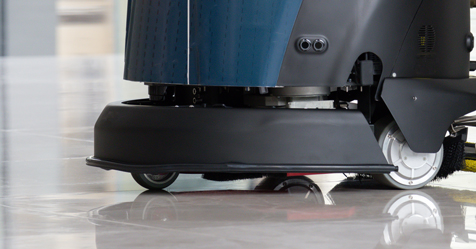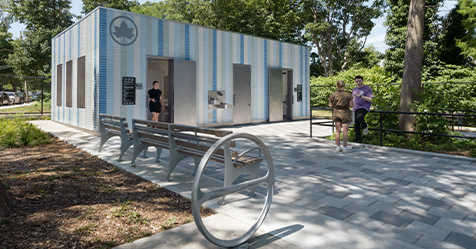Isaac Johnson, REH, is the resident regional manager, department of environmental services, with Duke University Health System under the auspices of Crothall Healthcare Inc., a division of Compass Group North America.
In this role, Johnson oversees more than 50 managers and over 600 front-line associates at the 5.5 million square-foot, 1000-plus bed, on-campus Duke University Hospital — also known as Duke University Medical Center — located in Durham, North Carolina.
For more than 20 years, Duke University Medical Center has been named as one of the top hospitals in the U.S. as part of the annual U.S. News & World Report’s Best Hospitals edition.
Duke University Hospital is also a well-known, best-practice teaching and learning hospital.
The environmental services group under Johnson follows suit, having adopted best practices in information access, cross-training, clean technology and human resources to optimize performance, productivity, and perhaps most importantly, its people.
Information Access & Mobility
Each of Johnson’s managers has a Microsoft Surfaces tablet within reach loaded with Epic electronic medical record-keeping (EMR) software accessing its “bed-tracking” function.
This software enables a mobile, cloud-based virtual office, allowing managers to:
- Perform patient-room Quality Assurance (QA) checks
- Assess available associates or workers on the floor
- Track patient rooms needing cleaning or attention
- Deploy workers to different areas
- Determine how long cleaning or service takes (“turn times”)
- Respond quickly to requests
- Check e-mail.
Freeing the management team from the constraints of a physical office and desk, while providing a detailed and birds-eye view of the entire operation, has improved response times, productivity and customer service and eliminated the need to gather in an office to coordinate activities and paperwork.
“It’s green, since all of our forms are on the system,” Johnson notes. “It is also web-based, so I can be at home, for example, and see we have 45 ‘unclean beds’ and 32 people available to clean them.”
Electronic, precise and in-depth recordkeeping also enables benchmarking with like facilities within the Crothall system of 1,200 healthcare clients across 38 states.
Importantly, all calendars, work and training schedules are in the mobile system.
Performance Through Cross-training
Training plays a major role in logistics and productivity.
Cross-training team leaders to handle whatever tasks come along is important.
This training enables rapid response time without calling in a “special-project” person or postponing jobs until staff resources are available to handle jobs like biohazardous waste management or floorcare, for example.
“If a floor needs stripping and recoating, instead of calling in an off-site person who knows how to do it, or postponing until we can assign the right personnel, on-site cross-trained team leaders can handle most jobs immediately,” Johnson says.
“Our team leaders receive intensive training until they become proficient and skilled in a range of specialties.”
During a 16-week pilot, one team leader received concentrated training for the entire week: Monday through Thursday, learning one new discipline each morning and another discipline during the last half of the day, followed by deep review and skills testing.
Every six months, cross-trained team members receive refreshers to stay proficient, also practicing new skillsets as needed in day-to-day operations.
“[Both Duke and Crothall] have a very close relationship with the union and view associates as our common customer. Cross-training provides more value to the customer, so they can in turn provide more value to their customer — patients,” Johnson explains.
Associates are also supplied with color-coded microfiber mops and cloths, and Johnson is trialing new products such as disposable microfiber wipes to enable faster response and hygienic outcomes without the need for laundering cloths.
“They are durable and effective, and each wipe can clean an entire room before disposal, so disposable microfiber can reduce laundering, cloth wear and tear, and downtime,” Johnson states.
Integrating disposable microfiber wipes with conventional cloths may permit associates to offer patients the option, or choice, in room-cleaning techniques as part of a service “menu.”
This is in keeping with Duke University Medical Center’s emphasis on customer choice and service that helps sustain high HCAHPS (Hospital Consumer Assessment of Healthcare Providers and Systems) scores.
Human Resources — The Worker As Customer
Johnson adds: “Our culture is simple: As a management team, we ensure that our number one customer is our associate — the person that works for us — and in turn our associate makes patients and guests their number one priority, and we provide them whatever they need to help make their customer happy, healthy and protected. When we get complaints, we first seek out our associate and work with them to help their customers.”
“We have Crothall ‘patient experience managers’ and visit 95 percent of patients every day to see how things are going, interact and handle special needs or requests. We often ask patients what they want or prefer for cleaning and disinfection, and work with Infection Prevention (IP) to ensure requested approaches work. We emphasize customer choice, and it’s reflected in our HCAHPS scores.”
Allen Rathey wrote this article on special assignment for IEHA’s Media Assistance Program (MAP). Rathey is president of InstructionLink/JanTrain Inc. of Boise, Idaho. He also serves as president of the Housekeeping Channel (HC), the Healthy House Institute (HHI) and the Healthy Facilities Institute (HFI). Rathey promotes healthy indoor environments, and writes and speaks on healthy cleaning and facility topics.
About REH
Registered Executive Housekeeper (REH) is the highest educational designation offered by the nonprofit IEHA (formerly, the International Executive Housekeepers Association).
REH status is renewed every three years by examination or by submitting 30 hours of continuing educational credit.
Requirements include completing a bachelor of arts or sciences degree from an accredited college or university and being proficient in areas including: Management Philosophy & Style; Communication; Planning & Organizing; Staffing & Staff Development; Continuous Improvement; Housekeeping; Work Controls; Pest Control; Chemical Controls; Waste Management; Purchasing; Accounting and Budgets; Microbiology; Safety and Security; Interiors; Laundry and Linen.
About Duke
Duke’s home campus is situated on nearly 9,000 acres in Durham, North Carolina.
Duke University Hospital is the flagship of the broader Health System, which also includes two community hospitals — Durham Regional Hospital and Duke Raleigh Hospital — and more than 200 ambulatory care clinics.
About Crothall Healthcare
Crothall Healthcare provides specialized, high-quality and responsive support services for the healthcare industry.
Its five core support services are:
- Environmental services
- Patient transport
- Laundry & linen
- Facilities management
- Healthcare technology solutions
Crothall strives for operational excellence in healthcare through its framework of People, Process, and Performance: key elements of its service delivery.
With more than 1,200 healthcare clients, and servicing nearly 300 million square feet across 38 states, Crothall Healthcare has been recognized as one of the Top 100 Best Places to Work in Healthcare.


